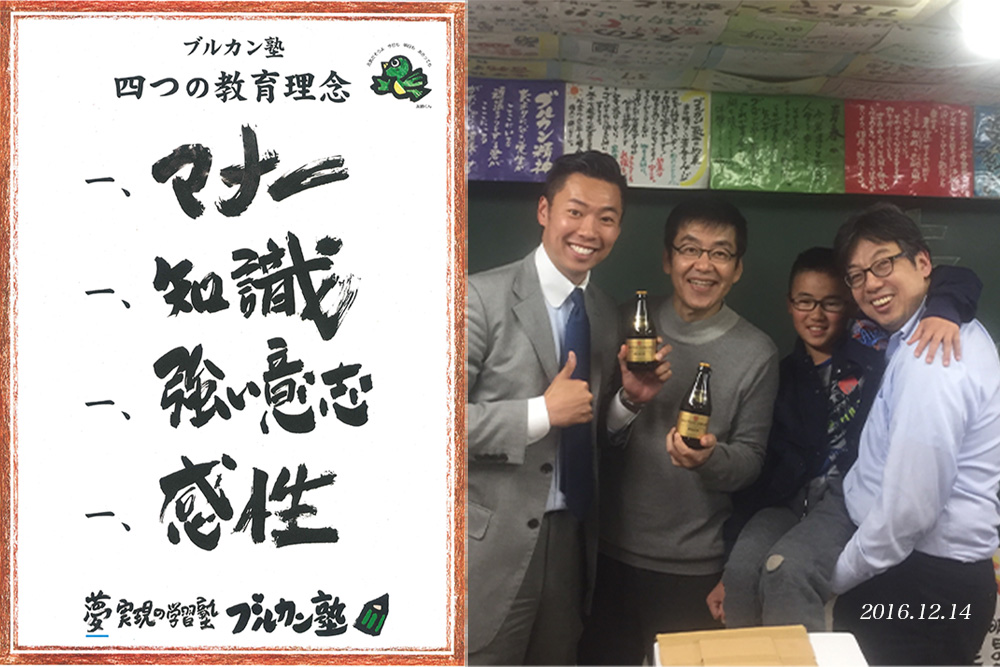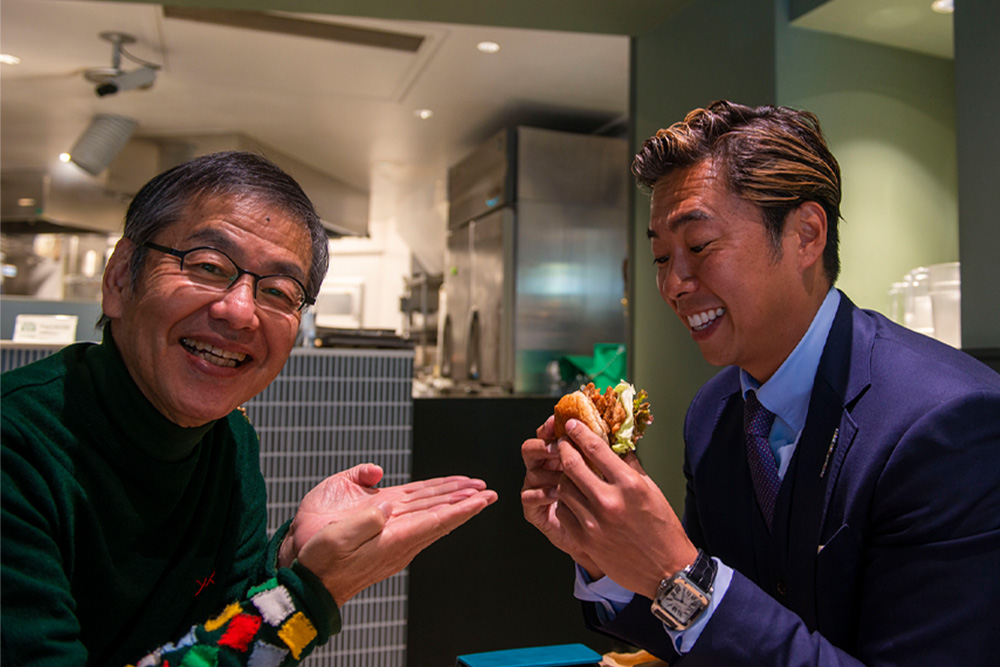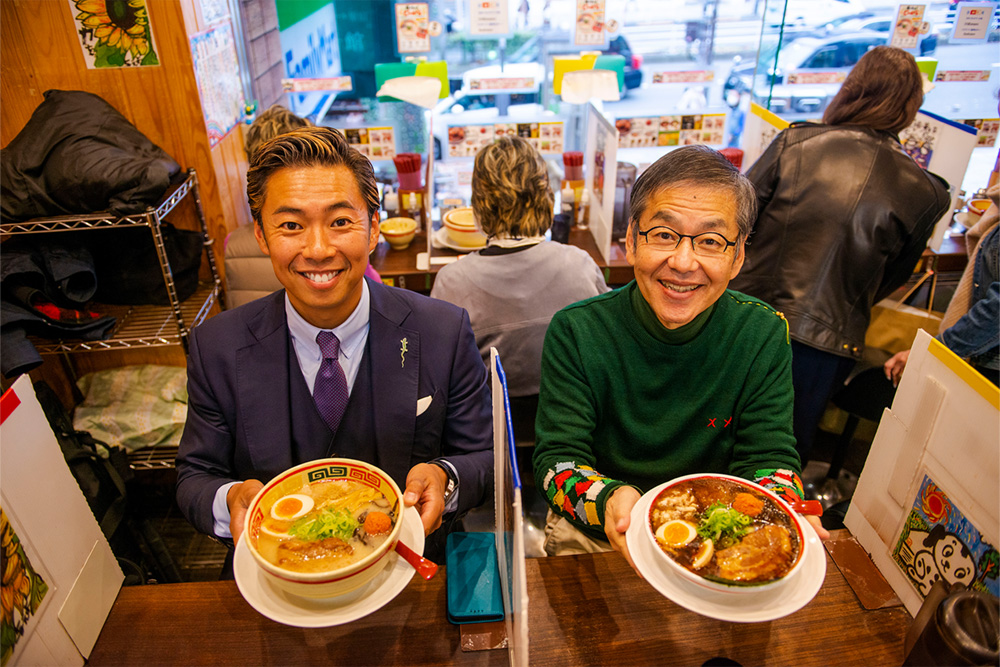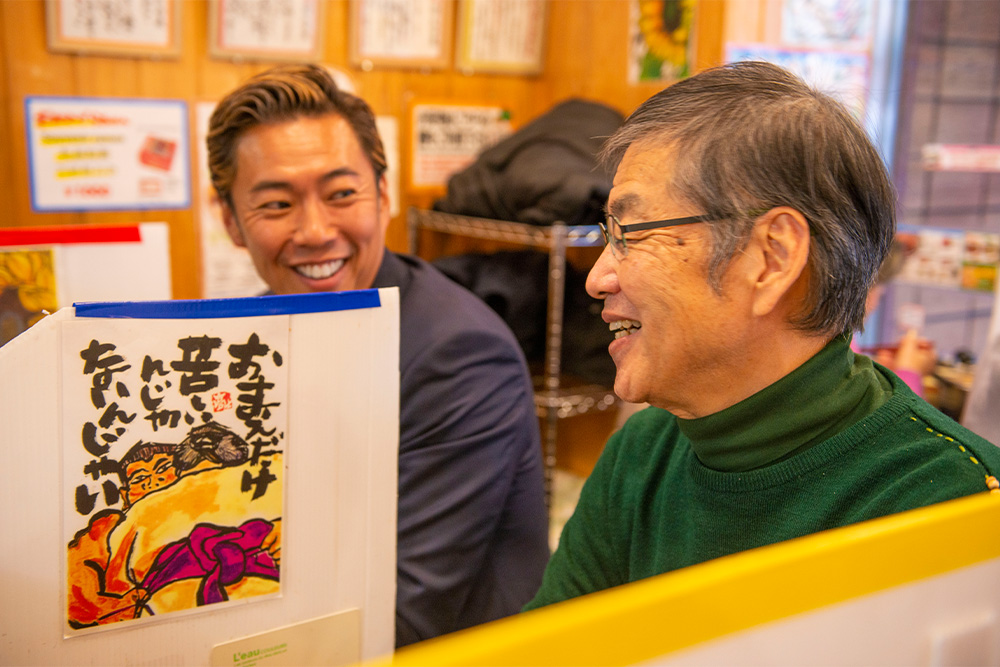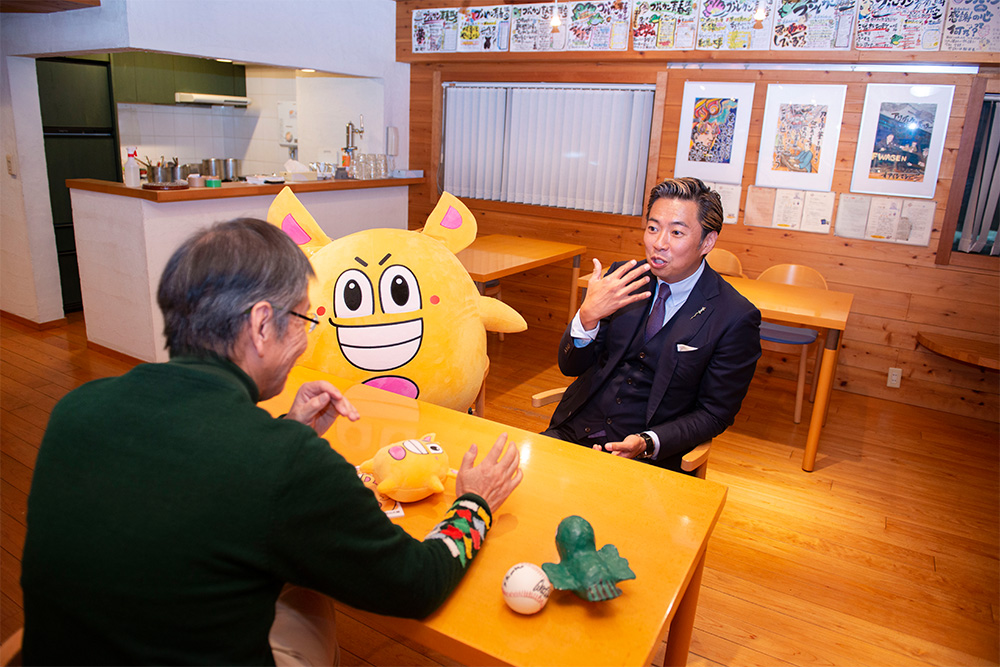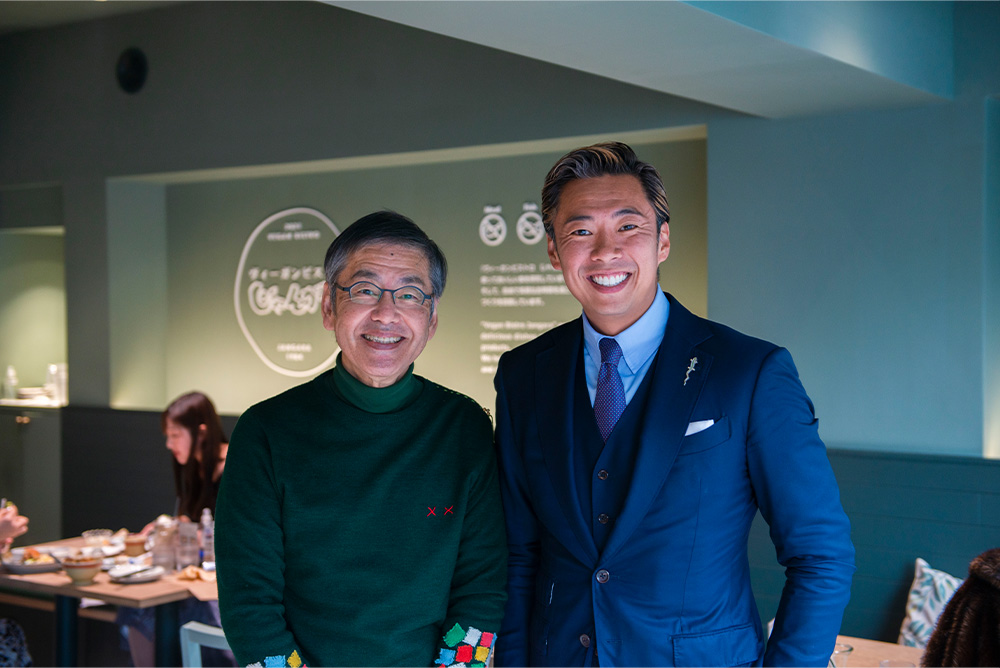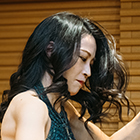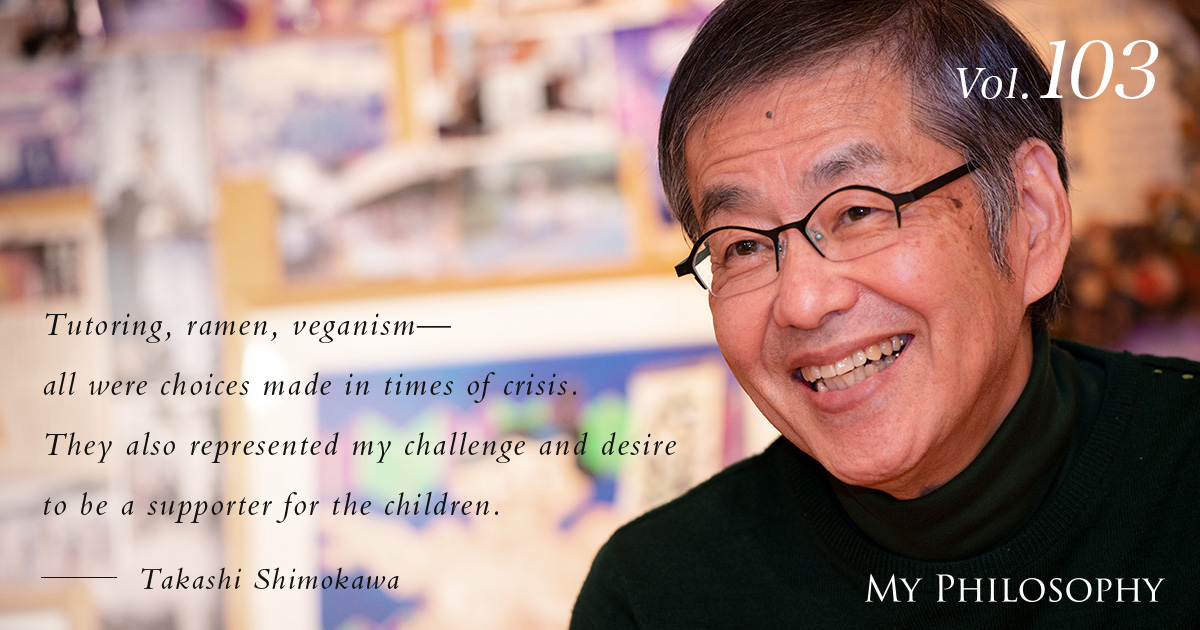
In this interview, Mr. Takashi Shimokawa, who runs the preparatory school "Bulkan Juku" and is also the pioneer behind "Kyushu Jangara Ramen," a renowned tonkotsu ramen chain, shares his insights. In 2021, he ventured into blending ramen with vegan cuisine by opening "Vegan Bistro Jangara," contributing to the popularization of vegan food. He discusses his hopes and fears for the children who will shape Japan's future, the life lessons learned from managing businesses in the vastly different fields of education and food service, and what he believes is necessary for achieving happiness.
Profile
Vol.103 Takashi Shimokawa
Principal of the preparatory school "Bulkan Juku" | President and CEO of Tass Group
Born in Tokyo in 1954 and raised in Kumamoto, Takashi Shimokawa graduated from Kumamoto Prefectural Tamana High School and then from the Department of Political Science, Faculty of Law, Keio University. In 1979, aiming to nurture not just academic achievements but also the mental growth of children, he established the preparatory school "Bulkan Juku" in Suginami (now located in Osaki, Shinagawa Ward).
To stabilize the financial foundation of the somewhat unstable preparatory school business, in 1984, he founded "Kyushu Jangara Ramen" and opened its first store in Chiyoda Ward Sotokanda. This venture became a precursor to the tonkotsu ramen boom of the early Heisei era, even securing the top spot in annual gourmet magazine rankings. Currently, there are six branches in locations including Akihabara, Harajuku, Ginza, Akasaka, and Ikebukuro.
Mr. Shimokawa opened “Vegan Bistro Jangara” in Harajuku COVID-19 pandemic in 2021, with the help of his wife Masako, who opened a full-scale vegan restaurant "T’s Restaurant" in Jiyugaoka in 2009.
Since 2012, Kyushu Jangara has been introducing vegan options in its menu. He has also participated in the development of vegan culinary projects, including in-flight meals for Japan Airlines and a collaboration with New Touch for cup noodles, working towards the expansion of vegan cuisine.
*The titles and positions mentioned are as of December 2022, the time of the interview.
Four Philosophies of Bulkan Juku
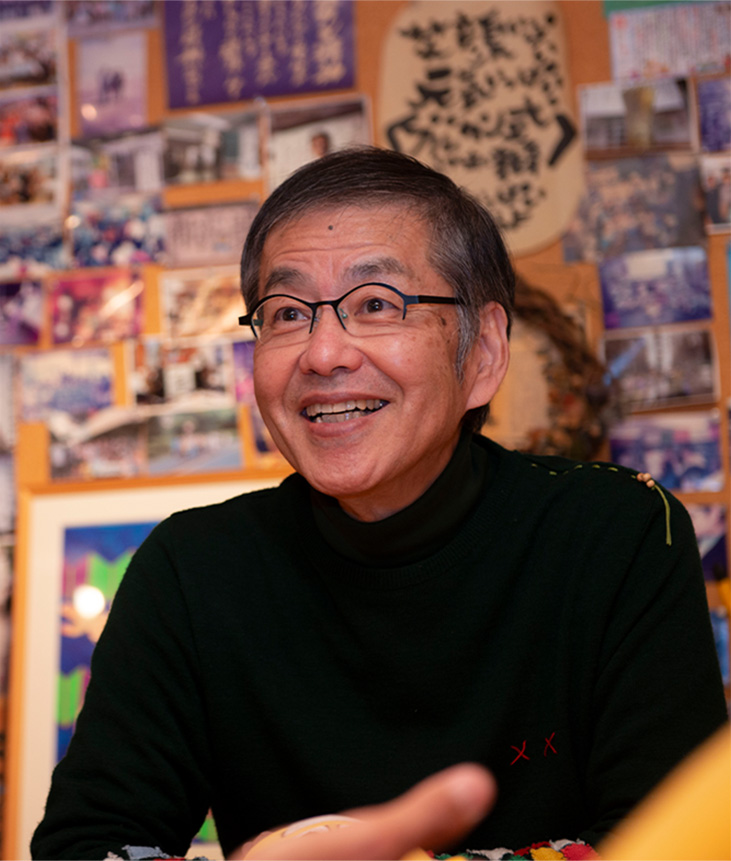
Bulkan Juku, a preparatory school targeting elementary to junior high school students, places a strong emphasis on entrance examination preparation. However, what I value most is the healthy mental growth of the children. I want them to recognize that each individual is born with a unique mission, to feel grateful for their existence, and to live a joyful life. To achieve this, Bulkan Juku operates under four guiding principles.
The first principle is “Manners,” followed by “Knowledge” as the second. The third is “Strong will,” and the fourth is “Rich sensitivity. While one might expect a preparatory school to prioritize knowledge above all, we at Bulkan Juku believe manners come first. Knowledge comes next, and a “Strong will” to acquire that knowledge is the third. Mastering these three elements is enough to become a wonderful adult, but if you acquire the fourth, “Rich sensitivity”, your life will become even more enjoyable.
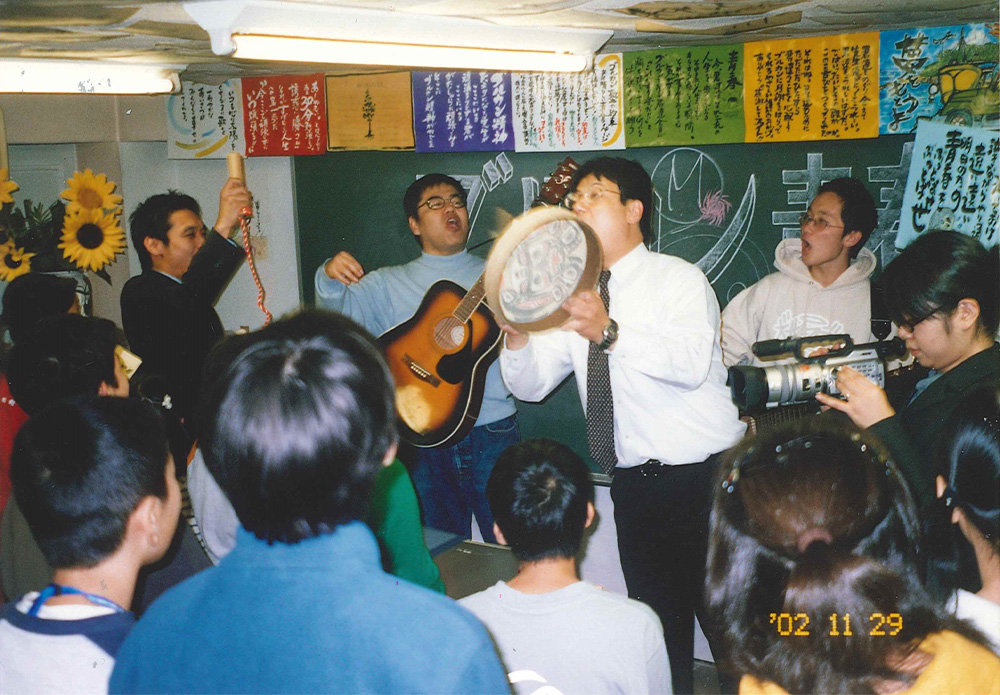
An essential part of Bulkan Juku’s curriculum is the “Bulkan Youth Course,” an extracurricular class held approximately every three months on dates that work best for the students. With the advent of nuclear families, the decline in birth rates, and changing family structures, coupled with diminishing community ties, there are fewer individuals involved in a child’s discipline. Hence, we initiated these sessions to act as a “third-party adult” to teach greetings and etiquette to the children. While improving academic performance remains our primary goal, having a trustworthy adult presence is also crucial for achieving that goal.
In the Youth Course, children and instructors discuss various themes from the same standpoint, ranging from “What does it mean to follow rules?” to “What is an entrance exams?” Sometimes, we invite guests or instructors share their passionate experiences. Through these discussions, we nurture sincerity and the spirit of striving towards goals.
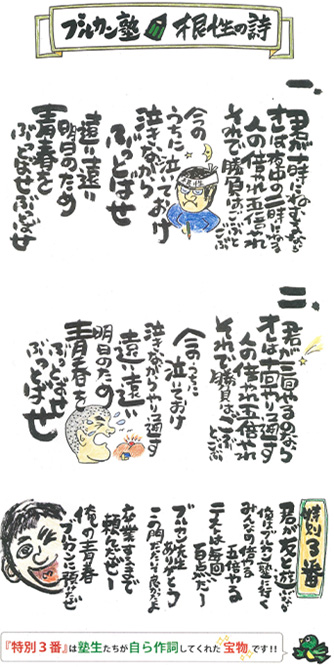
At the end of each course, we all join shoulders to sing together. One of the songs is themed around the message we want to convey to the children at that time, while the other is a cheer song for Bulkan Juku, “The Song of Grit,” which I composed. It’s a moment when everyone’s spirits unite.
Humans aren’t born to suffer; we’re born to enjoy life. Hence, I want the children to be individuals who can articulate their thoughts into words and then into actions. It’s the “Thought → Word → Action” formula. When faced with difficulties, I want them to think positively about how to overcome these obstacles and find a way forward on their own. I believe this is how the future opens up.
By the way, “Bulkan” is a combination of “Bul,” from bulldog, and “Can,” from company, signifying companionship. It represents a bulldog with a friendly face and an indomitable spirit, surrounded by many friends sharing their dreams. This name originates from a club I created during my student days, the “Bulldog Company,” abbreviated as Bulkan.
From Bulkan Juku to “Jangara Ramen
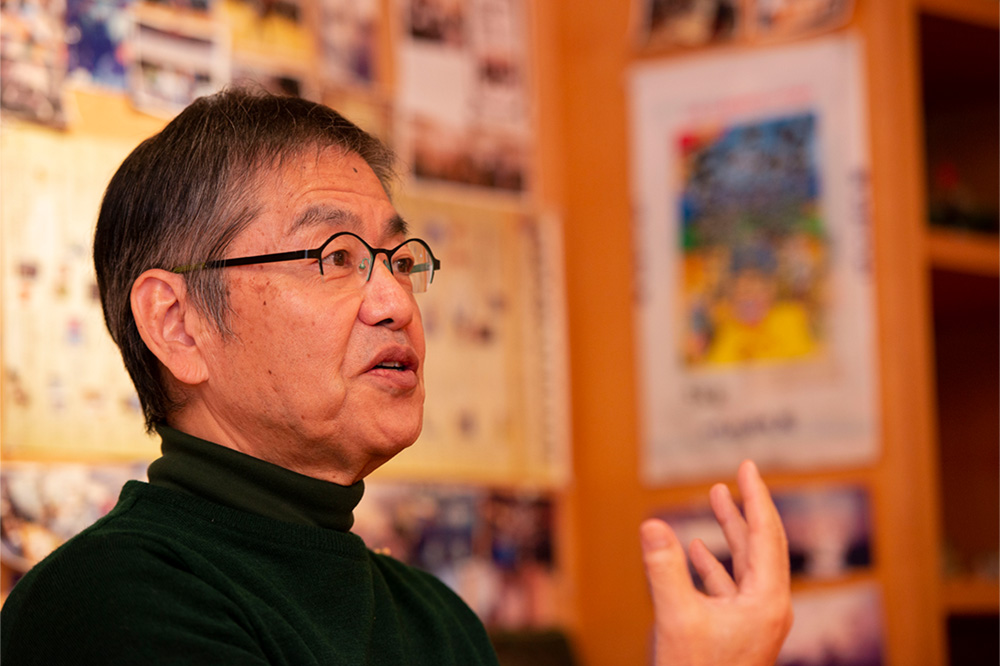
After graduating from university, I joined Yakult Honsha Co., Ltd.; Yakult’s head office. However, I started Bulkan Juku because I loved children and youth dramas, and also because I wanted to bring my mother to Tokyo care and to give back to her what she deserves, since she raised me as a single mother from the third grade of elementary school. Now, at the age of 95, my mother has become somewhat reliant on care due to an indoor fall. When a strong-willed mother apologizes for being a burden despite my busy schedule, it’s tough as a son. My response is always, “Don’t be sorry, you don’t have to feel that way.” However, this is a natural part of aging, a part of “living.” That’s why I’m committed to performing filial duties without regrets in my life. And I aim to convey to my students the importance of cherishing the present time.
I digress a bit, but in 1979, I opened the school in Suginami. Although we expanded to Kamiigusa, Osaki, and Hamadayama, around the fourth year, due to the economic situation, several families were unable to pay tuition. It was unthinkable to disenroll children who were earnestly attending classes. I continued tutoring some students without charge, which, naturally, made our financial situation unstable. Therefore, I thought about securing our livelihood first to continue Bulkan Juku’s mission.
But what should I do? That’s when I thought of ramen. Tamana City in Kumamoto, where I spent my youth, is famous for its tonkotsu ramen. I decided to compete with the taste of my hometown. After learning from scratch from chefs in Kyushu and through trial and error, in 1984, I opened “Kyushu Jangara Ramen” in Akihabara, the electric town. Since then, I have been managing both the school and the restaurant. Bulkan Juku and ramen might seem like an odd combination, but over the years, the staff have beautifully balanced the “place of philosophy” and the “place of practice.”
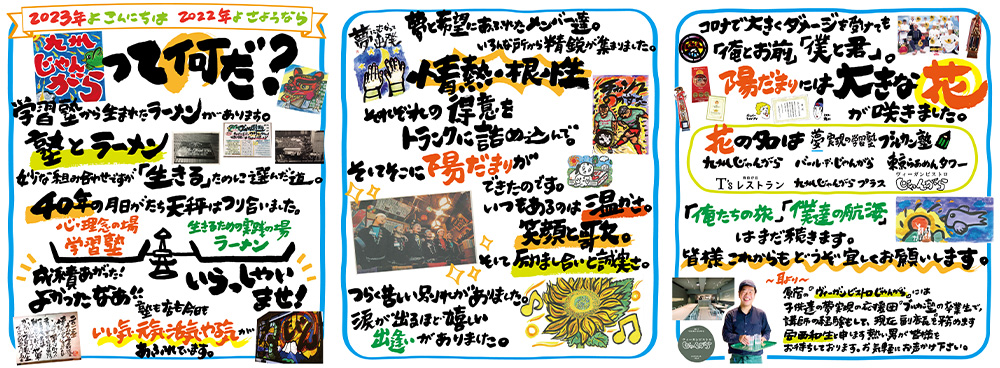
The key to management as understood in COVID-19
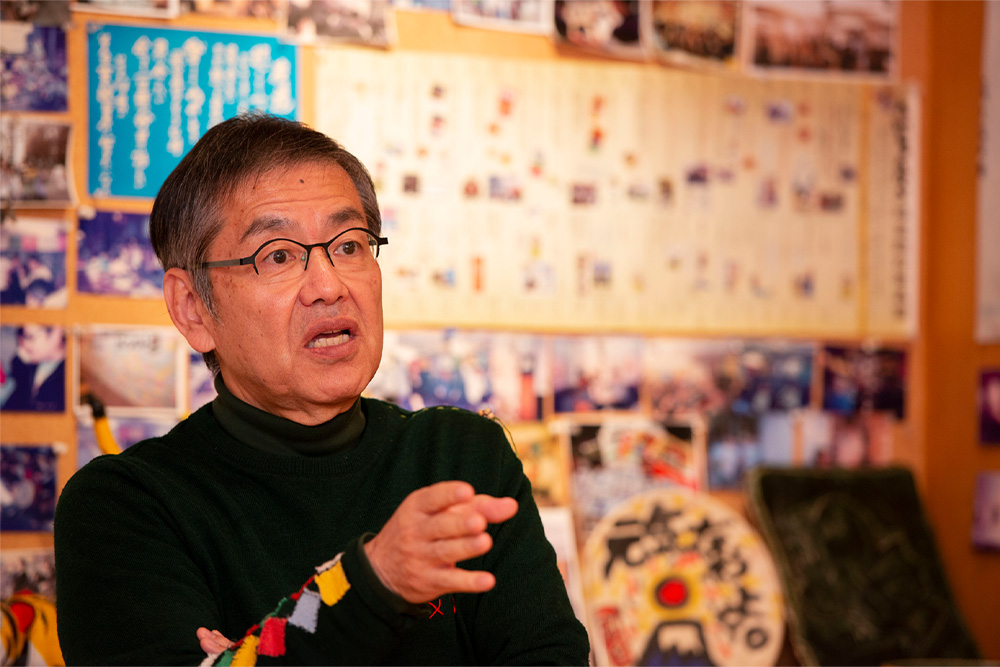
The COVID-19 pandemic forced significant decisions in our business operations. Our restaurants, primarily located in downtown areas with high rents, faced particular challenges. For instance, in Harajuku, we operated “Kyushu Jangara” on both the first and second floors of the same building. Normally, during such a crisis, one might consider returning the second floor to the landlord to cut costs, especially given the impact of the pandemic and the desire to reduce rent expenses.
However, I took great pride in having many employees, believing firmly in the strength of our unity. The question of what would become of the workplace for employees who had worked so hard loomed large. I reflected deeply on this. Our company’s survival has been due to our employees;—they are the foundation and treasure of our business. Moreover, the second floor in Harajuku had elevated Kyushu Jangara to a national and even international standard. It was unthinkable to let go of it. So, I made a decision. Defying the odds with the spirit of “We won’t let COVID-19 defeat us!” rather than giving up, we renovated the second floor into a new vegan concept, “Vegan Bistro Jangara.” Opening a vegan specialty restaurant was a decision that had been brewing for some time. I see it as a challenge chosen after considering all positives, embodying the mindset that “Tough times bring an opportunity!”
From Ramen to Vegan
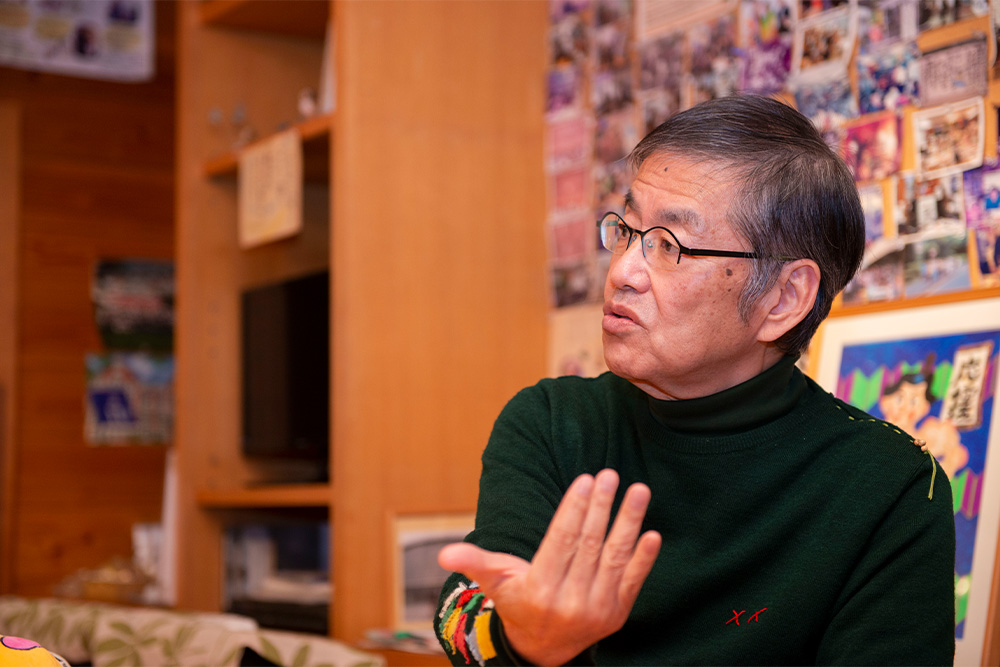
About a decade ago, I was significantly overweight and ended up developing diabetes. When you’re overweight, it’s rare to stop and think, “This isn’t good.” It’s difficult to recognize when you’re in a bad state. For me, it was a senior colleague’s remark that made me aware. I had fallen asleep, snoring loudly, at a celebration in my honor, and a senior colleague who heard me snore noticed, “Maybe there’s something wrong with his body, ” and later scolded me, saying, “You’re in serious trouble.”
That was a turning point, leading me to drastically change my lifestyle, starting with my diet. It had been three years since my wife, Masako, started “T’s Restaurant,” a vegan eatery, in Jiyugaoka. I shifted to a balanced diet, considering calorie intake and consumption, stopped using the car for short distances, and avoided escalators and elevators. Being disciplined, I took all the advice I received seriously and thoroughly changed my lifestyle, quickly returning to my high school physique. Thanks to these changes, I lost 30 kilograms in a few months, my blood sugar levels significantly dropped, and I regained my health. The transformation was so rapid that even the staff at the stores I frequently visit didn’t notice. My health has been maintained ever since.
In 2012, we started incorporating vegan options into Kyushu Jangara’s menu, developing dishes like “Kumamoto Ma-Yu Vegan Ramen” and “Vegetable-based Soy Sauce Ramen.” Since 2015, vegan options have been available at all Kyushu Jangara locations. Kyushu Jangara is primarily a tonkotsu ramen chain, so the flavors are quite strong and wild. Vegan Bistro Jangara, with the support of T’s Restaurant, aims to offer familiar dishes in impactful flavors that appeal even to meat lovers.

One of the challenges in restaurant management is operations. About a decade ago, our restaurants were operated by teams of about eight staff members, but now, they can operate with just three people. This efficiency is due to increased employee skills and a reduction in operational waste. However, I do wonder whether young people will choose to work in the food and beverage industry in an era where they have many career options. It’s a job filled with fun, joyful, moments of deep satisfaction.
Develop DOers (people who take action)
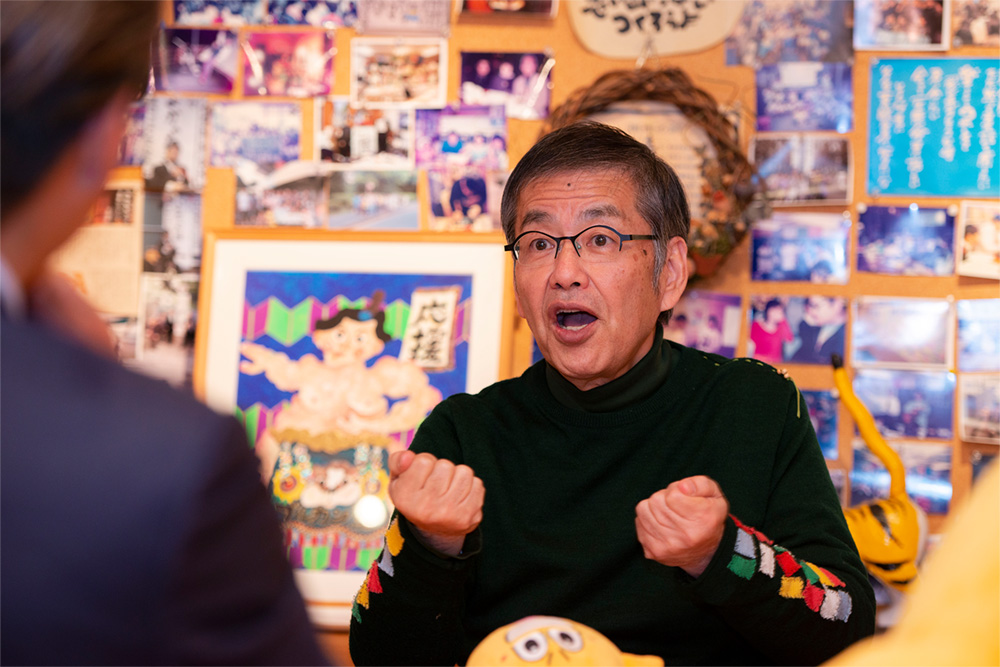
Observing children and contemplating how far they will grow is a source of joy for me. Among them, some transform remarkably. When I see a young, energetic businessman, I can’t help but think about how, at a crossroads, choosing a positive path can lead to success, while dwelling on the negatives can lead to less favorable outcomes. Being involved in the growth of children and young people is truly rewarding.
When I look at a child, I focus on two elements: DNA and environment. The environment includes the child’s efforts and the support they receive from those around them. Often, meeting a child’s parents clarifies a lot about the child. After all, parents are the ones who create the environment, and we hope to assist in making it as beneficial as possible.
In today’s ultra-informative society, fueled by the development of social media, raising children has become more challenging. For example, how do children view YouTubers or TikTokers? There are cases where young people, burdened with debt, manage to repay it by earning money as YouTubers. This might lead to a misconception that making money is easy, which is a concerning reality. Observing these phenomena makes me wonder what goals children will set for themselves and what they will value in the future. It reminds me to keep learning and stay alert to the changing world.
I ponder what the future holds for Japan. I want young people to use new tools, including social media, to make the world their stage while cherishing Japan. I wish for children to have dreams unique to them, saying, “I want to do this! I want to try that!” and I strongly feel that we should be their cheerleaders, helping turn those dreams into reality.
I constantly ask myself, “Have I managed to be on the side of the children?” This question feels like the essence of Bulkan Juku’s mission.
Happiness Is a Choice We Make
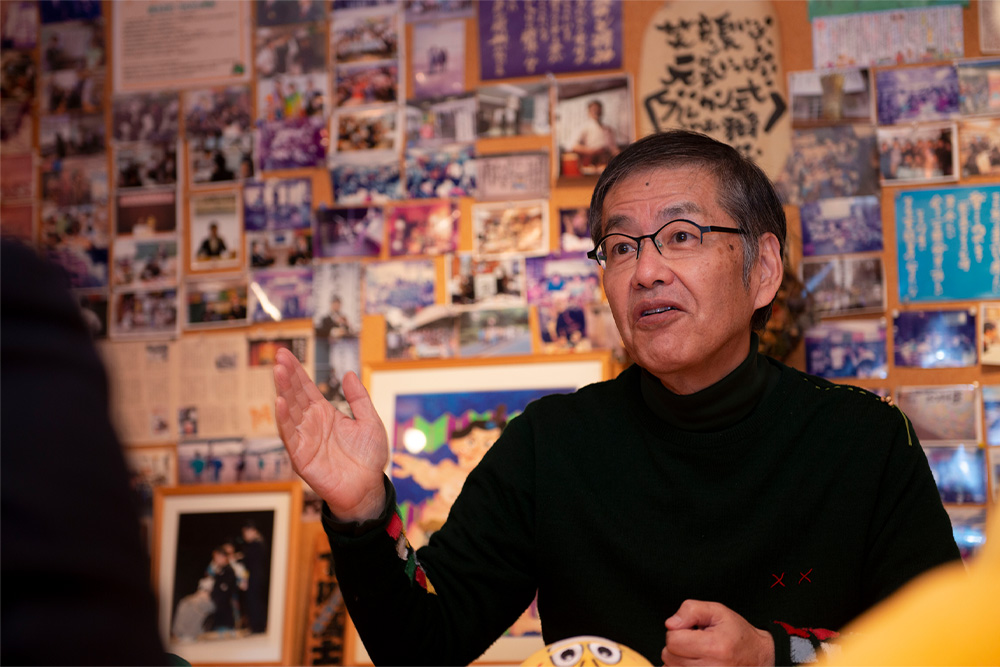
What I want to convey to all of you today is about freedom. People often express a desire to be “free” or assert that “people should be free.” However, what I’ve come to understand at my age is that true freedom doesn’t really exist. Freedom is a complex notion, constrained by laws among other things. Essentially, freedom lacks tangibility. But there is one clear form of freedom: the liberty to choose whether to be happy or unhappy.
This choice involves “Do”: the act of making a decision and taking action. Through “Do,” we can tilt the scales toward happiness.
This raises the question: What is necessary for happiness? Based on my observations of various joys and sorrows throughout life, I believe happiness hinges on three key elements.
The first is financial “Wealth.” The presence or absence of money significantly impacts the range of actions available to us. Money can fulfill some desires. The second element is harmonious “Human Relationships.” Having a life filled with love, including family and friends, is indispensable. While acquiring these two elements is crucial, they only account for about 5% of what’s needed for 100% happiness. The remaining 95% lies in “Physical and Mental Health.” The value and potential residing in our health are immense. With good health, anything is possible.
Deciding How to Live
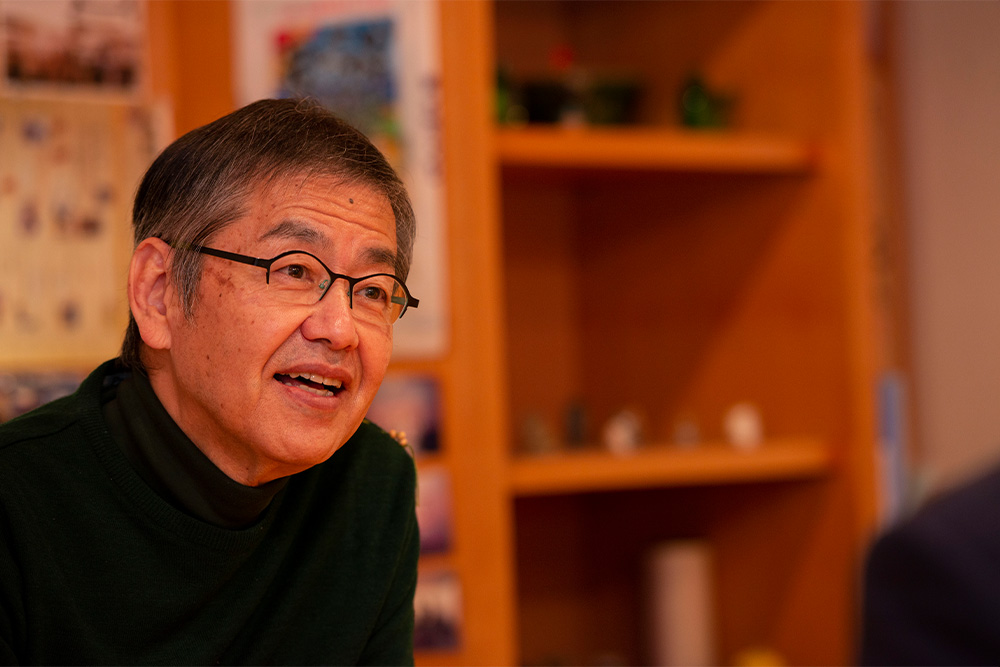
Observing those around me has made it clear how crucial it is to decide how I want to live and what words I choose to use. It’s said that words carry an invisible power, a spirit, and what we hold in our hearts often slips out unintentionally. Words can carry a soul with them, capable of bringing happiness or unhappiness to others. For instance, yelling, complaining, or using negative language tends to spread like an infection, affecting those around us. Throughout various challenges and crossroads in life, I’ve learned to make positive choices through the process of thinking, speaking, and then acting (the Mind → Word → Action equation).
As I’ve grown older, I’ve come to realize that it’s best to judge based on outcomes. The results that manifest are incontrovertibly accurate facts, rendering excuses and well-meaning interpretations meaningless. The outcome is paramount. Therefore, it’s important to analyze the results carefully and proceed forward, taking action based on a framework of making positive choices. This approach ensures that the results will invariably improve. Everyone makes mistakes, but there’s no need to be disheartened by failure; it’s a waste of time. As we oscillate between failure and success, we gradually become adept at making positive choices. Even if we get hurt, we must keep moving forward. I believe that effort is always rewarded.
DOer (pronounced “doer”)【noun】: A compound of “do” + “er,” meaning an executor, someone who has their own set of principles and decides their actions for themselves.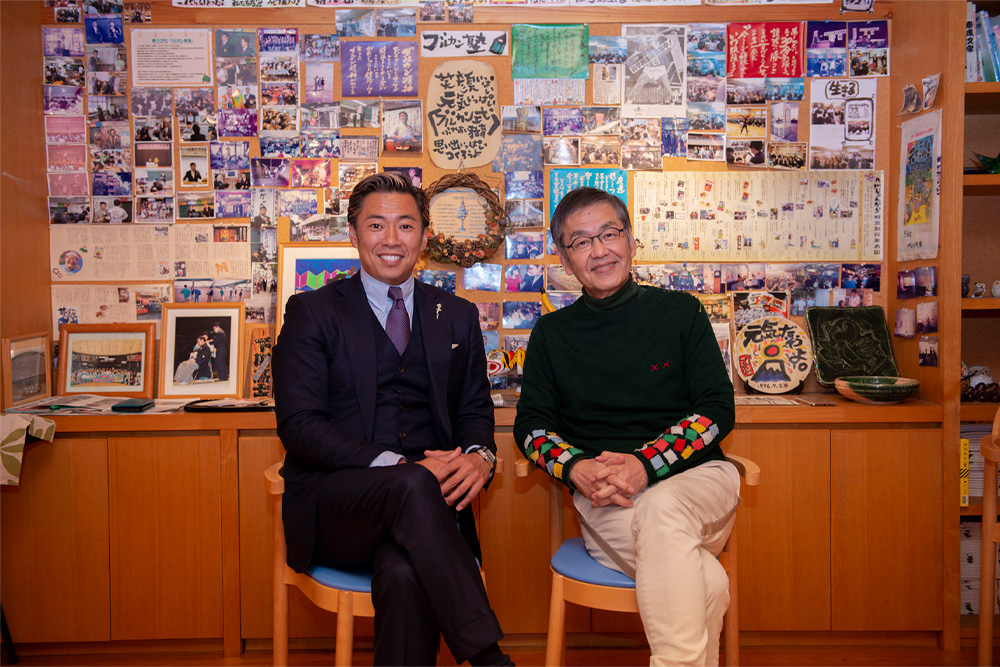
Speaking with Mr. Sugiyama, a quintessential DOer, is an overwhelming experience (in a good way, of course). The reason? His energy is simply incredible. Yet, despite this, he’s neither autocratic nor tyrannical but instead, bright and spirited. The more you talk with him, the more you realize what a wonderful person he is, a genius in his own right. He values his family greatly and has a fantastic team around him, whom he treats with utmost care and respect. He’s an ideal DOer.
During this interview, as I engaged in a heartfelt and passionate conversation with Mr. Sugiyama… I came to a realization. “So, this is it. How have I, without any backing or initial capital, managed to live surrounded by such wonderful companions up until now? It’s because I’ve been a DOer all along!” This insight was a revelation to me. Thank you, Mr. Sugiyama,for this enlightenment. I look forward to your continued guidance, though I ask you to be gentle (laughs).
Principal of Bulkan Juku | President and CEO of Tas Group Takashi Shimokawa
I first met Mr. Takashi Shimokawa when my younger son joined Bulkan Juku in his fourth year of elementary school, about 9 years ago. It was during one of the “Youth Courses” that I got the chance to meet him. Participants sang together, creating a fun and engaging study atmosphere. Although I hadn’t had the opportunity to meet Mr. Shimokawa since the onset of the COVID-19 pandemic, a chance encounter occurred last year at a hidden restaurant in Harajuku that he operates. Mr. Shimokawa seldom makes appearances, so I was convinced this encounter was meant to be. It happened just as I was overcoming a difficult period, and his warm smile and words brought me to tears, marking a heartfelt reunion.
For this interview, I visited “Vegan Bistro Jangara” in Harajuku, followed by “Kyushu Jangara Ramen,” and finally Bulkan Juku to gather stories.
I’m particularly fond of the lyrics from the Youth Course song:
“If you go to bed at 10, I’ll sleep at 2 in the morning. Work twice, five times as hard, and the odds will be fifty-fifty.”
It truly captures the essence of experiencing “youth” through diligent study and work.
With the courage to act and the decision to “DO,” unimaginable futures await. I look forward to collaborating with Mr. Shimokawa on educational programs to nurture young individuals into DOers. Enjoying Kyushu Jangara Ramen with the owner was an unparalleled experience.
December 2022, at Bulkan Juku Edited by:DK Sugiyama Photography: Atsushi Arakane




